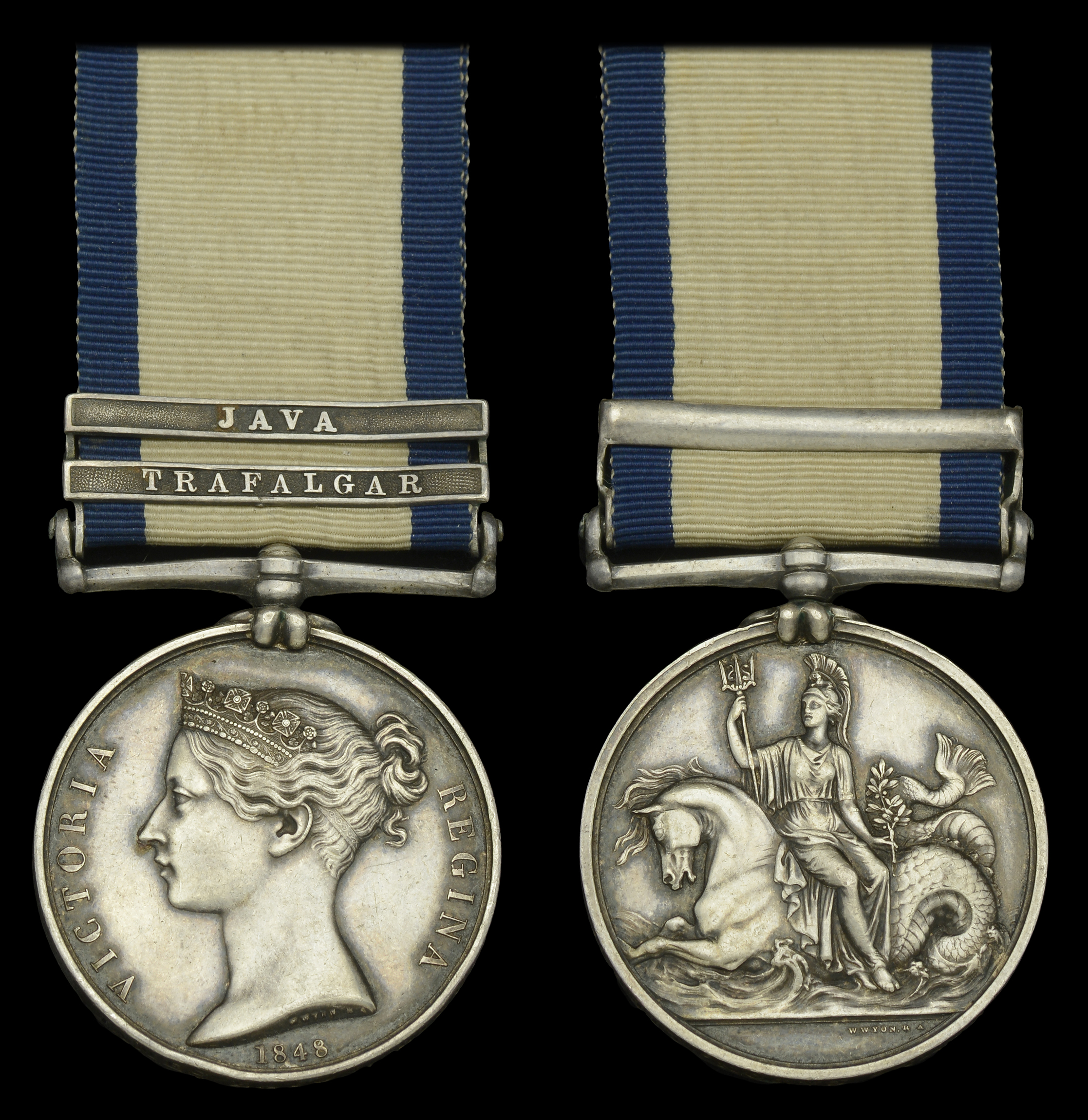The Naval General Service 1793-1840 medal awarded to Commander James Eaton, Royal Navy, who as Signal Midshipman of Téméraire at Trafalgar had the honour of repeating from the Victory Nelson’s last immortal signal “England Expects,” &c., and also assisted during the action in lashing to the Téméraire the French 74-gun ships Fougeux and Redoubtable, one on either side, being rewarded with a commission for these services Naval General Service 1793-1840, 2 clasps, Trafalgar, Java (James Eaton, Lieut.) small edge bruise and slight bend to suspension, good very fine £16,000-£20,000 --- Importation Duty This lot is subject to importation duty of 5% on the hammer price unless exported outside the UK --- --- Provenance: Peter Dale Collection, July 2000. 51 clasps for Trafalgar issued to H.M.S. Téméraire, including 7 officers. James Eaton was born at Pimlico, London, in 1783, and was baptised on 11 March 1785, at Llandongo, Monmouthshire. He entered the Navy on 13 February 1799, as First-class Volunteer on board the Quebec 32, Captain Henry Wm. Bayntun, stationed in the West Indies; became Midshipman, 2 September 1800, of La Prompte 20, Captain Robert Philpot; and on removing to the Hannibal 74, Captain Solomon Ferris, was quartered in the mizen-top, and narrowly escaped destruction, when that ship, having grounded under the enemy’s batteries, was compelled, after a long and deadly resistance, inflictive on her of a loss of 81 men killed and 62 wounded, to strike her colours, in the action off Algeciras, 6 July 1801, on which occasion he was taken prisoner. Being exchanged on the 18th of the same month, he returned home in the San Antonio 74, Captain Hon. George Heneage Lawrence Dundas, one of the prizes taken near Cadiz in the battle of the 13th. After an attachment of 20 months, as Admiralty-Midshipman, to the Atalante 16, Captain Joseph Ore Mansfield, during which period he was very constantly engaged on open-boat service in the suppression of smuggling, and on one occasion, 9 October 1803, assisted at the cutting out, in face of a fiery opposition, of two French ketches and a brig, near St. Gildas, in Quiberon Bay. In March 1804 Mr. Eaton joined the Téméraire 98, Captain Eliab Harvey. Being Signal-Midshipman on the memorable 21 October 1805, he had the honour of repeating from the Victory Nelson’s last immortal signal, “England expects,” &c.; and he also assisted during the action in lashing to the Téméraire the French 74-gun ships Fougueux and Redoubtable, one on either side. For his conduct he was rewarded with a commission dated 13 January 1806, and appointed to the Lion 64, Captains Robert Rolles and Henry Heathcote. During the nearly six years of his continuance in that ship, Mr. Eaton took out a convoy to China; was severely wounded, while in temporary command of her tender, in an attack made on that vessel by 13 Malay pirate war-junks; and, independently of one or two particular services, co-operated in the reduction of Java. On 8 September 1812, after having been laid up for some time at Haslar Hospital, he was appointed First of the Beaver 10, Captain Edward O’Brien Drury, by whom, in July 1813, he was sent home with despatches containing intelligence of the American Commodore Rodgers and his squadron having put into North Bergen, on the coast of Norway. On rejoining the Beaver he particularly distinguished himself by his intrepidity, on 24 October 1813, in putting off in the jolly-boat, with the only three men out of the whole ship’s company who would volunteer, to the rescue, during a violent gale, of the crew of a Swedish vessel then on the point of foundering. Mr. Eaton, who was compelled to invalid in August 1814, from a severe attack of rheumatism, brought on by overexertion and exposure, with the loss also of the sight of one eye, and who had not since been employed, accepted his present rank of Commander on 26 May 1842. He married his cousin Anne (born Cannock, Staffordshire) in 1816, and after leaving the Navy moved with her to West Bromwich where he became a successful businessman with interests in coal mines and land. In 1838, he was in partnership with William Salter and William Raybould when they took on a 21-year lease from Lord Dartmouth for the Heath Colliery. He moved into Hill House, Dagger Lane, West Bromwich, in 1837 and died there on 28 February 1857, aged 71 years.





